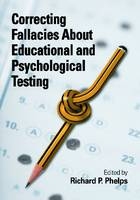
Correcting Fallacies About Educational and Psychological Testing
Seiten
2009
American Psychological Association (Verlag)
978-1-4338-0392-5 (ISBN)
American Psychological Association (Verlag)
978-1-4338-0392-5 (ISBN)
- Titel z.Zt. nicht lieferbar
- Portofrei ab CHF 40
- Auch auf Rechnung
- Artikel merken
Standardized testing bears the twin burden of controversy and complexity and is difficult for many to understand either dispassionately or technically. This book describes the state of public debate about testing across fields. It explains the primary criticisms of testing.
Standardized testing is used for diagnosis, selection, and achievement measurement by individuals in many fields, including psychology, education, employment, and professional credentialing. Its benefits are numerous, substantial, and scientifically proven. However, these benefits are not well articulated or well publicized.In their technical communications, measurement specialists are generally positive about the worth of standardized testing. Meanwhile, those who engage public debate, such as journalists and certain special interest groups, tend to be less scientifically informed and more negative about the value of testing. The contributors to this volume contend that most criticisms ignore readily accessible scientific evidence and have the unfortunate effect of discrediting the entire testing enterprise.Standardized testing bears the twin burden of controversy and complexity and is difficult for many to understand either dispassionately or technically. In response to this reality, Richard P. Phelps and a team of well-noted measurement specialists present this book as a platform where they: describe the current state of public debate about testing across fields; explain and refute the primary criticisms of testing; acknowledge the limitations and undesirable consequences of testing; provide suggestions for improving testing practices; and, present a vigorous defense of testing and practical vision for its promise and future.Those who are charged with translating the science of testing into public information and policy - including administrators, social scientists, test publishers, professors, and journalists who specialize in education and psychology - should find a wealth of usable information here with which to balance the debate.
Standardized testing is used for diagnosis, selection, and achievement measurement by individuals in many fields, including psychology, education, employment, and professional credentialing. Its benefits are numerous, substantial, and scientifically proven. However, these benefits are not well articulated or well publicized.In their technical communications, measurement specialists are generally positive about the worth of standardized testing. Meanwhile, those who engage public debate, such as journalists and certain special interest groups, tend to be less scientifically informed and more negative about the value of testing. The contributors to this volume contend that most criticisms ignore readily accessible scientific evidence and have the unfortunate effect of discrediting the entire testing enterprise.Standardized testing bears the twin burden of controversy and complexity and is difficult for many to understand either dispassionately or technically. In response to this reality, Richard P. Phelps and a team of well-noted measurement specialists present this book as a platform where they: describe the current state of public debate about testing across fields; explain and refute the primary criticisms of testing; acknowledge the limitations and undesirable consequences of testing; provide suggestions for improving testing practices; and, present a vigorous defense of testing and practical vision for its promise and future.Those who are charged with translating the science of testing into public information and policy - including administrators, social scientists, test publishers, professors, and journalists who specialize in education and psychology - should find a wealth of usable information here with which to balance the debate.
Richard P. Phelps has devoted most of his working life to the world of education. His work on testing has been published in Evaluation Review, the Industrial-Organizational Psychologist, and Educational and Psychological Measurement. Herbert J. Walberg, a distinguished visiting fellow at the Hoover Institution and a member of the Koret Task Force on K-12 Education, is a University Scholar at the University of Illinois at Chicago and chairman of the board of directors of the Heartland Institute in Chicago. J. E. Stone is the founder and moderator of the Education Consumers Clearing House, and a professor of education at East Tennessee State University.
| Erscheint lt. Verlag | 30.1.2009 |
|---|---|
| Zusatzinfo | Illustrations |
| Verlagsort | Washington DC |
| Sprache | englisch |
| Themenwelt | Geisteswissenschaften ► Psychologie ► Test in der Psychologie |
| ISBN-10 | 1-4338-0392-5 / 1433803925 |
| ISBN-13 | 978-1-4338-0392-5 / 9781433803925 |
| Zustand | Neuware |
| Haben Sie eine Frage zum Produkt? |
Mehr entdecken
aus dem Bereich
aus dem Bereich
Buch | Softcover (2023)
Springer (Verlag)
CHF 62,95
warum es gut ist, das Leben zu hinterfragen
Buch | Hardcover (2024)
Ullstein Buchverlage
CHF 34,95


